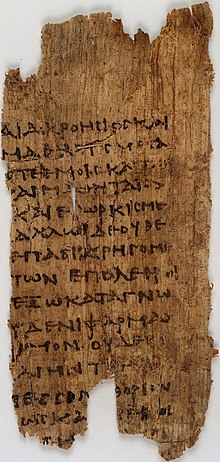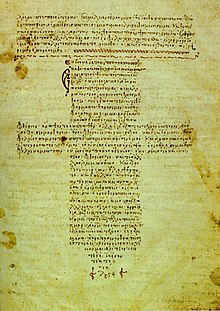Hippocratic oath
The oath of Hippocrates (or Hippocratic oath ), named after the Greek physician Hippocrates of Kos (around 460 to 370 BC), is a doctor's vow originally written in Greek and is considered the first fundamental formulation of medical ethics . However, the authorship of the oath is unclear. First attested in the 1st century under the Latin title iusiurandum, the code of obligations was passed on as part of the Corpus Hippocraticum , a collection of medical texts, as Ὅρκος ( Horkos , "oath") and assigned to Hippocrates.
The classic form of the Hippocratic oath is not taken by doctors and has no legal effect, but it still has an impact on the formulation of modern alternatives, such as the Geneva Declaration of the World Medical Association . It contains several elements that are still part of medical ethics today (requirement not to harm the sick, confidentiality , prohibition of sexual acts on patients, etc.). Some parts no longer correspond to today's conditions (for example the ban on operating on bladder stones, since surgeons were a separate profession alongside doctors); these are often reinterpreted according to today's circumstances (e.g. as a prohibition to carry out treatments for which the doctor does not have the necessary specialist knowledge). Termination of pregnancy and active euthanasia are expressly prohibited by the Hippocratic oath.
In Germany, neither the oath nor the Geneva vow is mandatory after the license to practice medicine, but these are argued as an ethical guideline or code of ethics in discussions on medical ethics in particular.
text
|
Greek original |
German translation |
| " Ὄμνυμι Ἀπόλλωνα ἰητρὸν, καὶ Ἀσκληπιὸν, καὶ Ὑγείαν, καὶ Πανάκειαν, καὶ θεοὺς πάντας τε καὶ πάσας, ἵστορας ποιεύμενος, ἐπιτελέα ποιήσειν κατὰ δύναμιν καὶ κρίσιν ἐμὴν ὅρκον τόνδε καὶ ξυγγραφὴν τήνδε . | "I swear, calling on Apollo the doctor and Asklepios and Hygieia and Panakeia and all the gods and goddesses as witnesses, that I will fulfill this oath and this obligation to the best of my ability and judgment: |
| Ἡγήσασθαι μὲν τὸν διδάξαντά με τὴν τέχνην ταύτην ἴσα γενέτῃσιν ἐμοῖσι, καὶ βίου κοινώσασθαι, καὶ χρεῶν χρηίζοντι μετάδοσιν ποιήσασθαι, καὶ γένος τὸ ἐξ ωὐτέου ἀδελφοῖς ἴσον ἐπικρινέειν ἄῤῥεσι, καὶ διδάξειν τὴν τέχνην ταύτην, ἢν χρηίζωσι μανθάνειν, ἄνευ μισθοῦ καὶ ξυγγραφῆς, παραγγελίης τε καὶ ἀκροήσιος καὶ τῆς λοιπῆς ἁπάσης μαθήσιος μετάδοσιν ποιήσασθαι υἱοῖσί τε ἐμοῖσι, καὶ τοῖσι τοῦ ἐμὲ διδάξαντος, καὶ μαθηταῖσι συγγεγραμμένοισί τε καὶ ὡρκισμένοις νόμῳ ἰητρικῷ, ἄλλῳ δὲ οὐδενί. | he who taught me this art, to respect my parents equally, to share the livelihood with him and to provide for him when he is in need; to equate his descendants with my brothers and, if they so wish, to teach them this art free of charge and without a contract; To give advice and lectures and all other instructions to my and my teacher's sons, as well as to the students who, according to medical practice, are bound by the contract and obliged by the oath, but not to anyone else. |
| Διαιτήμασί τε χρήσομαι ἐπ 'ὠφελείῃ καμνόντων κατὰ δύναμιν καὶ κρίσιν ἐμὴν, ἐπὶ δηλήσει εὲ κξαὶ νιρεεινινικεινινικεινινικει νιρε. | I will make my ordinances for the benefit of the sick, to the best of my ability and judgment; I will save them from harm and arbitrary injustice. |
| Οὐ δώσω δὲ οὐδὲ φάρμακον οὐδενὶ αἰτηθεὶς θανάσιμον, οὐδὲ ὑφηγήσομαι ξυμβουλίην τοιήνδε. Ὁμοίως δὲ οὐδὲ γυναικὶ πεσσὸν φθόριον δώσω. Ἁγνῶς δὲ καὶ ὁσίως διατηρήσω βίον τὸν ἐμὸν καὶ τέχνην τὴν ἐμήν. | I will not administer or even advise any deadly poison to anyone, not even at their request. Nor will I ever give a woman an abortion drug. Holy and pure, I will keep my life and my art. |
| Οὐ τεμέω δὲ οὐδὲ μὴν λιθιῶντας, ἐκχωρήσω δὲ ἐργάτῃσιν ἀνδράσι πρήξιος τῆσδε. | I will not operate on the bladder stone either, but leave it to those whose trade it is. |
| Ἐς οἰκίας δὲ ὁκόσας ἂν ἐσίω, ἐσελεύσομαι ἐπ 'ὠφελείῃ καμνόντων, ἐκτὸς ἐὼν πάσης ἀδικίης ἑκουσίης καὶ φθορίης, τῆς τε ἄλλης καὶ ἀφροδισίων ἔργων ἐπί τε γυναικείων σωμάτων καὶ ἀνδρῴων, ἐλευθέρων τε καὶ δούλων. | Whatever houses I will enter, I want to go in for the benefit and piety of the sick, refrain from any arbitrary injustice and any other damage, including all works of lust on the bodies of women and men, free people and slaves . |
| Ἃ δ 'ἂν ἐν θεραπείῃ ἢ ἴδω, ἢ ἀκούσω, ἢ καὶ ἄνευ θεραπηίης κατὰ βίον ἀνθρώπων, ἃ μὴ χρή ποτε ἐκλαλέεσθαι ἔξω, σιγήσομαι, ἄῤῥητα ἡγεύμενος εἶναι τὰ τοιαῦτα. | What I see or hear during the treatment or outside of the treatment in people's lives, I will keep silent , as far as it is not allowed to be divulged, and consider such a secret. |
| Ὅρκον μὲν οὖν μοι τόνδε ἐπιτελέα ποιέοντι, καὶ μὴ ξυγχέοντι, εἴη ἐπαύρασθαι καὶ βίου καὶ τέχνης δοξαζομένῳ παρὰ πᾶσιν ἀνθρώποις ἐς τὸν αἰεὶ χρόνον . Παραβαίνοντι δὲ καὶ ἐπιορκοῦντι, τἀναντία τουτέων. " | If I now fulfill this oath and do not violate it, may I achieve success in life and in art and glory with all people until everlasting times; if I transgress it and perjury, the opposite. " |
Origin and history

There is no mention of the oath in the other writings of the Corpus Hippocraticum , nor in contemporary sources. The oldest known mention comes from Scribonius Largus , a Roman doctor from the environment of Emperor Claudius , i.e. from the 1st century AD. The time gap between Hippocrates (around 460 to 370 BC) and Scribonius Largus is not explained by any Document closed. The origin of the oath is lost in the darkness of history. The "Oath of Hippocrates" may have been written before Hippocrates. According to a theory of the classical philologist and medical historian Ludwig Edelstein , the oath as a moral code should be of Pythagorean origin. This thesis is hardly supported today, especially since there is a lack of evidence for a Pythagorean school of medicine and Edelstein also took the oath z. T. has interpreted it very speculatively. Rather, Edelstein's importance lies in having disenchanted the oath, an achievement that is still recognized today.
The text is by no means clear. Its wording has also been adapted again and again. This made it easier to take the oath in the late and post-ancient world ( Christianity , Islam ). The Hippocratic Oath is ultimately the testimony of a Greek sect that stands on the edge of the core writings of the "Corpus Hippocraticum". These writings were warmed up in the Roman world, where the medical profession had to be upgraded because, in contrast to Greece, in the Roman world it was considered a minor profession, one who only works with the hands. And from that moment on, the Hippocratic Oath practically became an object of ethical justification for medical practice. From the Renaissance into the 20th century, the oath was considered a key document of ancient medical ethics. Since the early modern period , doctoral silk and the statutes of the faculties of medical universities have also used set pieces from the Hippocratic oath, as have the oaths of other medical professions ( midwives , pharmacists , etc.).
In 1804, Hippocrates' oath was recited verbatim for the first time as an oath for medical graduates - at the Montpellier Medical School . Reading the oath has been one of the graduation ceremonies of many universities, especially in the USA, since the 20th century . In Germany , however, this hardly takes place.
Attempts are now being made to replace the oath with alternatives that are more contemporary. However, the principles of the oath can also be found in the German Criminal Code, in which, among other things, breaching medical confidentiality is punished with imprisonment.
In the GDR , the oath was introduced with reference to the social system with the following words:
"With a high commitment to the socialist society and its citizens, closely connected with the German Democratic Republic, I pledge ..."
Economic meaning of the oath
The oath had an economic meaning in the sense of an early social insurance. The included regulation on the maintenance and training of the teacher's descendants was economically secure for the periods of his incapacity for work. This worked like a generation contract or the discharge regulation in agriculture. At the same time, it was an illness insurance if the mutual treatment of colleagues was guaranteed free of charge.
See also
- Medical ethics
- Patient-doctor relationship
- Professional law and professional rules
- Assaf's oath
- Seventeen Rules of Enjuin
literature
- Axel W. Bauer : The Hippocratic Oath. Medical historical reinterpretation of an (un) known text in the context of the professionalization of the Greek doctor . In: Journal of Medical Ethics . No. 41.Schwabenverlag , 1995, ISSN 0944-7652 , p. 141-148 .
- Karl Deichgräber : The medical ethics of the Hippocratic oath. (1933) In: Hellmut Flashar (ed.): Ancient medicine. Darmstadt 1971 (= Paths of Research 221), pp. 94–120.
- Wolfgang U. Eckart : History of medicine . 5th edition. Springer, Berlin 2005, ISBN 3-540-21287-6 .
- Karl-Heinz Leven : Hippocratic oath. In: Werner E. Gerabek , Bernhard D. Haage, Gundolf Keil , Wolfgang Wegner (eds.): Enzyklopädie Medizingeschichte. De Gruyter, Berlin / New York 2005, ISBN 3-11-015714-4 , pp. 598-600.
- Renate Tölle-Kastenbein : The Geneva doctor's vow and the Hippocratic oath , Duris, Bochum 1978, ISBN 3-922130-02-X
- Charles Lichtenthaeler : The oath of Hippocrates. Origin and meaning. Deutscher Ärzte-Verlag, Cologne 1984, ISBN 3-7691-0088-3 .
- Markwart Michler : Medical ethics. In: Würzburger medical history reports 24, Königshausen & Neumann, Würzburg 2005, ISSN 0177-5227 pp. 268–281, here: pp. 268–272 ( The Doctors' Oath ).
- Eduard Seidler , Karl-Heinz Leven : History of medicine and nursing . 7th revised and expanded edition. Kohlhammer, Stuttgart 2003, ISBN 3-17-017624-2 .
- Wilfried Nolte: The Hippocratic oath and the final oath of the previous and current German-speaking universities, with additional consideration of foreign oaths , 1981, DNB 830719709 (dissertation University of Bochum 1982, 116 pages).
Web links
- A history of the oath. Summary of an article from the New England Journal of Medicine.
- The Hippocratic Oath Today: Meaningless Relic or Invaluable Moral Guide?
- The Hippocratic Oath. German translation and medical history commentary.
Individual evidence
- ↑ Compare Suda , keyword Ἱπποκράτης , Adler number: iota 564 , Suda-Online .
- ↑ Assistance in suicide is against medical ethos. In: Ärzteblatt. July 19, 2010.
- ↑ or "according to my ability and judgment"
- ^ Corpus Hippocraticum, Iusiurandum .
- ^ Pschyrembel Clinical Dictionary . 255th edition. de Gruyter, Berlin / New York 1986, ISBN 3-11-007916-X . P. 695 fsv Hippocratic oath .
- ↑ Jutta Kollesch , Diethard Nickel : Ancient healing art. Selected texts from the medical writings of the Greeks and Romans. Philipp Reclam jun., Leipzig 1979 (= Reclams Universal Library. Volume 771); 6th edition ibid 1989, ISBN 3-379-00411-1 , pp. 16-19 and 42 f. represent an origin at the beginning of the 4th century BC Chr.
- ↑ Willem F. Daems: To Helmut Gebelein: Alchemie. Munich: Eugen Diederichs 1991. In: Würzburger Medizinhistorische Mitteilungen , Volume 11, 1993, pp. 405-407, here: p. 406.
- ^ Gerhard Baader , The tradition of the Corpus Hippocraticum in the European Middle Ages. In: Gerhard Baader, Rolf Winau (ed.): The Hippocratic Epidemics. Theory - Practice - Tradition. Negotiations of the V. Colloque International Hippocratique (= Sudhoffs Archive . Supplement 27). Steiner, Stuttgart 1989, ISBN 3-515-04559-7 , pp. 409-419.
- ↑ § 203 Violation of private secrets. Federal Ministry of Justice.
- ↑ Walther Birkmayer, Gottfried Heindl: The love of God is an internist or the doctor in the anecdote. Paul Neff Verlag KG, Vienna / Berlin 1978, ISBN 3-7014-0146-2 .

